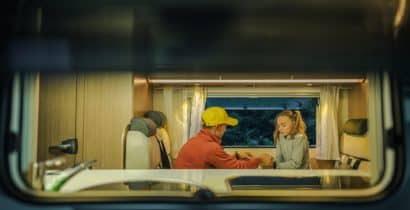Essential Tips for Life on the Road 
So you’ve decided you want to break free of your current lifestyle – rent and utilities are becoming more expensive, and keeping food on the table is a full time job. It can feel like a hamster wheel sometimes – eat, sleep, work and repeat until retirement. Yet there’s a whole wide world out there to explore, and the virility of youth is something you can’t get back once it’s gone.
If this mindset sounds familiar, you may be tempted to just cast it all aside and live a simple life on the road – sleeping in a van, caravan, or camper, waking up somewhere new every day, and seeing more of the world than the view from your office window. You may have even seen so called “vanlife influencers” on social media, and fallen in love with the idea – one that most people will only dream of living. Should you choose to make this dream lifestyle a reality, there are some things you should know and consider to make the transition as smooth as possible.
1 – Give yourself an appropriate transition period
One of the realities of modern life is the creature comforts we have built up around ourselves – possessions, furniture, and simple household items to name a few. Unfortunately, not all of this will fit into the back of a van or camper, and you may be surprised at how little of it you really need. It’s essential to give yourself time to sort what you can’t live without, what could be put in long term storage, and what to simply get rid of. This can be difficult for those who are sentimental, and might take a bit longer than you would expect. Factoring a transitional period of 4-8 weeks into your budget and timeline will put you in the best possible position to start your new lifestyle with as little stress as possible – and you may be pleasantly surprised with how much cash you’re left with after selling off the things you don’t need.
2 – Find a vehicle that is suitable for your everyday needs
It may sound simple, but selecting a vehicle to live and travel in for the foreseeable future is not a decision to take lightly. If you’re planning to hit the road solo, a converted van may be all the space you need to live comfortably, but if you have partners and/or pets to travel with, you’re almost definitely going to need something a little bigger. Caravans paired with a towing vehicle are a great option that allow you to drop your “home” off somewhere secure like a campground or caravan park while you explore the local area in your towing vehicle, or simply run errands without having to bring your entire living situation with you. Whatever you choose, keep in mind that it also needs to have room for things like your clean water supply, food, and portable toilet if you choose to have one, along with any other requirements for certified self containment as per your local laws and regulations. This will give you broader options when it comes to selecting somewhere to park up overnight.
3 – Plan your stops, but be flexible
You might be thinking that once you hit the road, you can just park up at any old place for the night – whether you can do this depends on local laws, but more often than not, it’s a good idea to look out for caravan parks, campsites, and other approved areas to avoid being fined, or worse, having your vehicle seized or impounded by local authorities. The good thing about approved camping sites is that they usually have facilities – showers, laundry, or even just somewhere you can fill up on clean drinking water are usually well worth the modest fees you might pay to stay at these places. Planning your stops a few days in advance is good practice, and having an idea of backup locations in the area is even better, should you show up somewhere that is fully booked or occupied. Google maps is all you really need to plan your stops, but there are some great camping apps and websites available that will make it even easier, including reviews from other campers so you know what to expect from a new location.
Hopefully these simple pieces of advice will give you an idea of what to expect from life on the road, and will prepare you for just a few of the everyday challenges that come with the lifestyle. Perhaps it will even inspire you to take the first steps towards a new kind of lifestyle you may have never considered before. Either way, stay safe, and happy travels!



